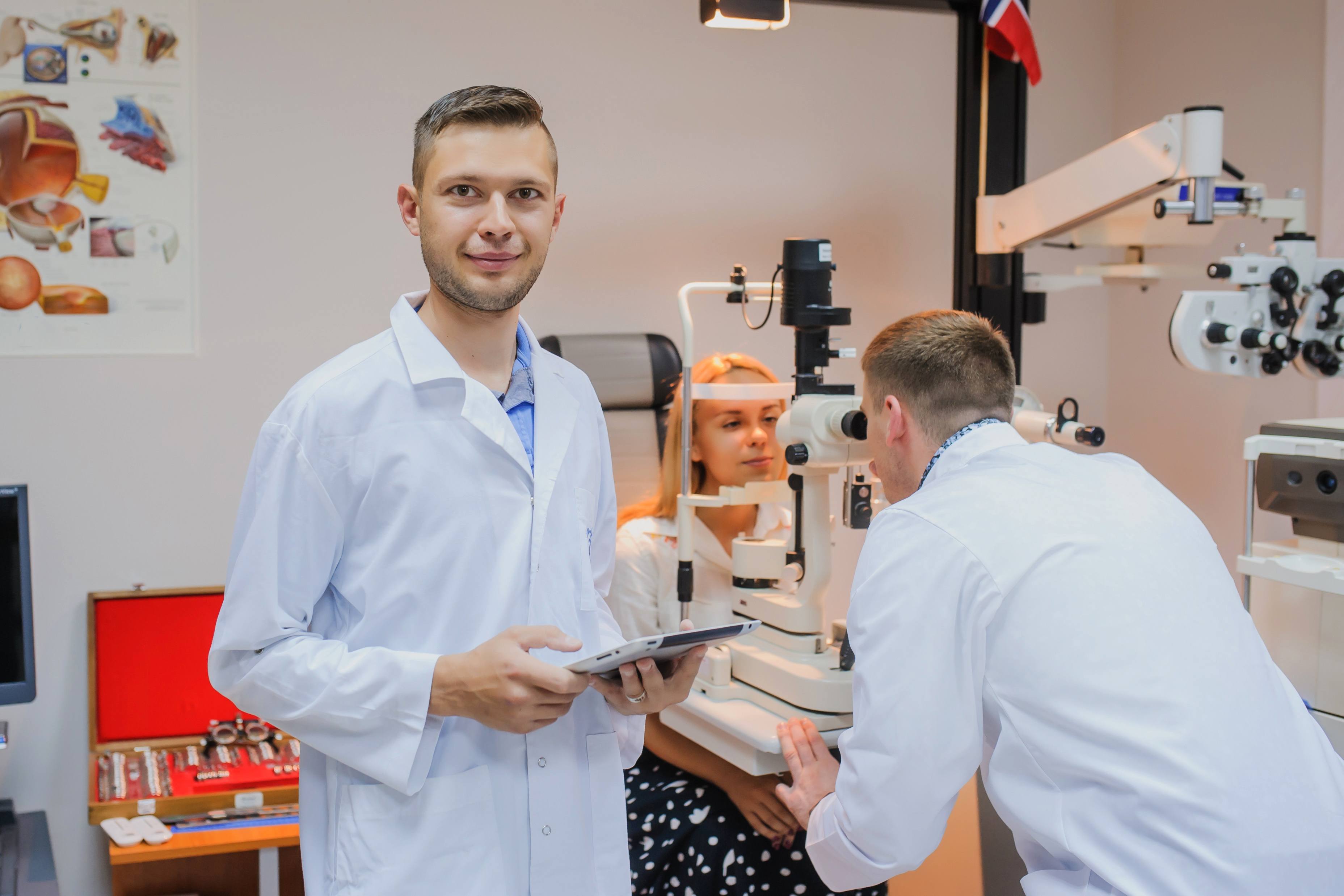Nationally recognized for student experience
The Wall Street Journal

Pre-Optometry
If you're interested in healthcare and want a good work-life balance, consider a career as an optometrist. A pre-optometry path is the perfect focus for those who like science and enjoy working with people to improve their quality of life.
Optometry deals with ocular, or vision, health – from recognizing the first signs of diabetes or cancer to corrective lens and laser treatments for many common eye disorders.
Pre-optometry is a pre-professional track at BGSU. Choosing this track is a great way to make sure you’re ready to apply to a Doctor of Optometry (OD) program after earning your bachelor’s degree.
Pre-optometry students not only take the classes required for admission to optometry school, but also have a major in a specific subject area.
Want more information?
Emma Pennington
Coordinator of Recruitment and Outreach
419-372-6805
eleader@bgsu.edu
Why choose to be a pre-optometry student at BGSU in Ohio?
Acceptance into optometry school is competitive. Our job is to help you meet the requirements and build a strong application. The earlier you prepare, the better chance you have to be accepted into the school of your choice.
By declaring as a pre-optometry student, you will have immediate access to the Office of Pre-Professional Programs. We are here for you from freshman orientation to graduation to help you make informed decisions about your path forward.
- Exceptional pre-optometry advising. BGSU stands out for its culture of support and personalized guidance. We know what professional schools are looking for in future optometrists and can help you develop those skills and qualities.
- A strong academic foundation. We know what prerequisites you must take, what GPA you need and how to prepare academically for optometry school. We offer you the support and tools you need to succeed.
- Mentorship, alumni and peer connections. Peer ambassadors offer a first level of support. You also will have many opportunities to shadow and hear from professionals in the optometry field. These relationships are invaluable as you explore career options.
- Hands-on opportunities. Optometry schools like well-rounded students. BGSU offers many student organizations and other ways for you to volunteer, be a leader and cultivate those credentials.
Our Center for Undergraduate Research can help you find research opportunities as early as your freshman year. Some BGSU students applying to medical schools have published papers or presented posters at conferences by the time they graduate.
- Application aid. We help you navigate the rigorous application process to optometry school.
- Excellent value. BGSU offers a high-quality, affordable education and generous scholarships.
- Proven success. Our graduates are well prepared and regularly accepted into outstanding optometry programs.
- Natural and Health Science Learning Community. Live with other students pursuing health-related majors. The extra academic support you receive in the community is a significant advantage for gaining admission to medical programs.
#1 public university in Ohio for career prep
The Wall Street Journal
Why choose a career as an optometrist?
Optometry can be a great fit if you have a passion for helping people and think you will thrive in a patient-centered and potentially entrepreneurial environment.
- Diverse career options. The field of optometry offers more than just traditional practice settings. You could specialize in pediatrics, geriatrics, contact lenses or even pursue research or industry careers. Around 25% of graduates undertake a clinical residency, and that number is growing.
- A stable work/life balance. Many optometrists work regular hours in private practice settings, allowing for more control over scheduling.
- Job security. The demand for qualified optometrists is expected to grow in the coming years, creating stable job opportunities with good salaries and benefits.
- Gratifying work. Unlike some medical fields, optometrists often act as a primary point of contact for eye care. You'll build relationships with patients and provide preventative care that impacts their lives in a tangible way.
- Pathway to a career as an ophthalmologist. Ophthalmologists are medical doctors who have completed an OD and at least eight postgraduate years of additional medical training. They practice eye-based medicine and surgery.
Career paths
- Individual private practice
- Partnership or group practice
- Retail optical settings
- Ophthalmologic professional settings
- Military/public health
- Interdisciplinary care
- Academic/research
- Corporate/industrial
Quick Facts from the Bureau of Labor Statistics
Curriculum
Coursework for pre-optometry students varies by major. Some majors include most, if not all, of the courses required for admission to optometry school.
Admission to optometry programs typically requires that you:
- Successfully complete the courses required for admission
- Have a strong science and overall college GPA
- Demonstrate a dedicated interest in healthcare delivery
It’s important to work with your academic advisor and the Office of Pre-Professional Programs to make sure you complete the prerequisites you need to apply to optometry school. Those prerequisites vary by program.
Students are responsible for verifying all prerequisite courses with the optometry school of their choice. Typically, admissions committees require these courses. (The equivalent BGSU courses offered are indicated in parentheses.)
Required Courses
- One year of English
- General biology (BIOL 2040/2050)
- General chemistry (CHEM 1230/40 or 1350 and CHEM 1270/80 or 1370/80)
- Organic chemistry (CHEM 3410/CHEM 3440/60)
- Anatomy and physiology (BIOL 3310/3320)
- General physics (PHYS 2010/2020)
- Microbiology (BIOL 3130)
- Biochemistry (CHEM 3080 or 4450/4470)
- General psychology (PSYC 1010)
- Math-statistics to calculus (MATH 1150, MATH 1220, MATH 1280, MATH 1310 or MATH 1340/1350)

Sample courses
- Anatomy and Physiology
- Community Health Planning and Evaluation
- Physics, Chemistry and Biology
- Microbiology for Health Professionals
- Health Care law
- Epidemiology
- Biology of Aging
- Medical Ethics
#1 university in Ohio – big or small, public or private – students would choose again
The Wall Street Journal
Request Information
Accreditation
Bowling Green State University [BGSU] is accredited by the Higher Learning Commission. BGSU has been accredited by the Higher Learning Commission since 01/01/1916. The most recent reaffirmation of accreditation was received in 2022-2023, with our next reaffirmation of accreditation scheduled for 2032-2033. Questions should be directed to the Office of Institutional Effectiveness.
Updated: 05/23/2025 01:29PM

